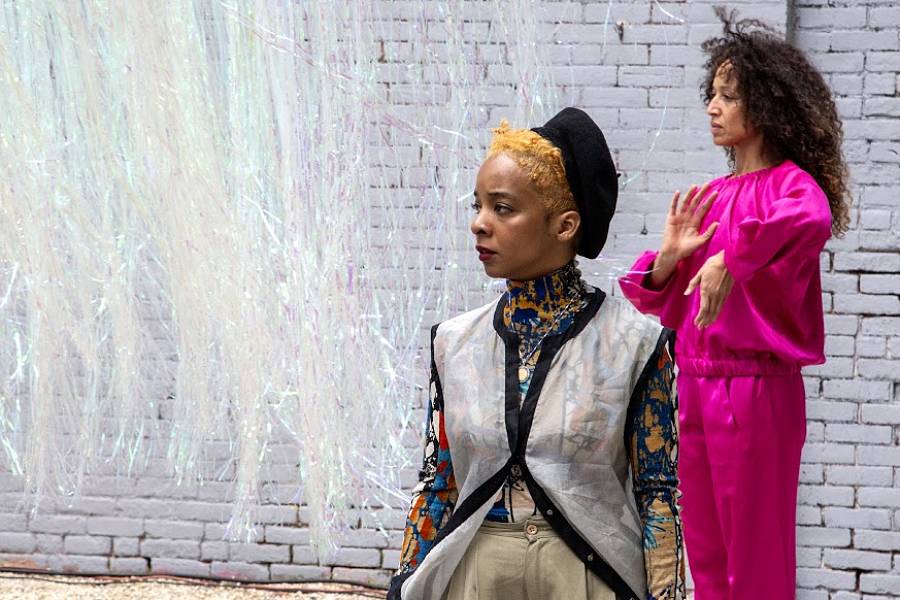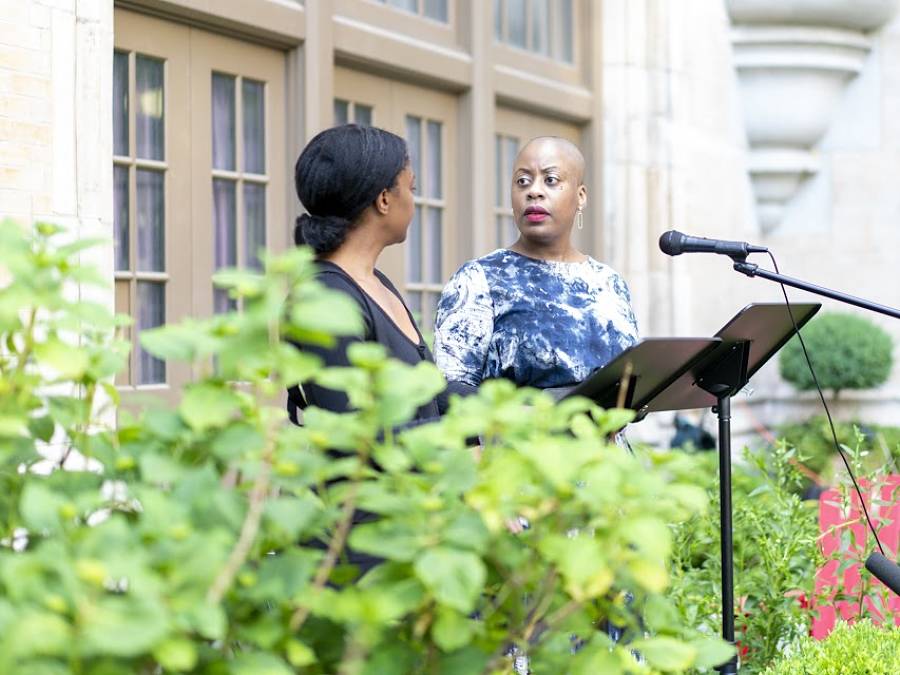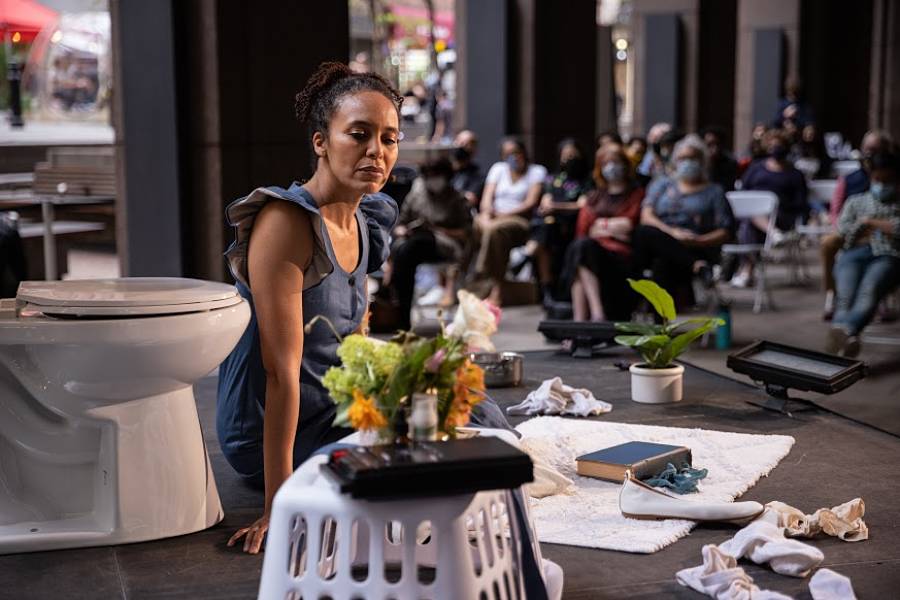I have to admit, I’ve had limited interactions with the work of Katheen Collins. Collins, a visionary playwright, poet, director, professor, and Civil Rights activist, died prematurely of breast cancer in 1988, at the age of 46. I was born only one year before this tragic loss, but Collins left behind a significant amount of work, some of which influenced Afrofemononomy, a supergroup of Black femme theatremakers whose work I recently had the pleasure of sampling. As someone who considers herself a theatre aficionado and connoisseur of the works of Black playwrights—especially Black women playwrights—I was perplexed as to why I had never previously encountered Collins’s plays in my studies.
It appears I was not the only one not privy to them. According to Brooklyn Magazine, Collins’s works had been tucked away for over a decade after her death, untouched in a trunk in the home of her daughter, Nina Lorez Collins. Even Eisa Davis (she/her), the playwright and actor (most recently seen in the hit HBO drama series Mare of Easttown), said she also wasn’t introduced to Begin the Beguine, a hitherto unproduced quartet of one-acts by Collins, until the latter half of 2016. That’s when she met Collins’s daughter Nina after performing excerpts of Collins’s short stories at the Brooklyn Public Library.
“She didn’t know me from a can of paint, and then after hearing me read from these stories, she was the one who suggested these plays,” Davis recalled. After learning of Begin the Beguine, Davis knew immediately that she wanted to have these short plays produced in some capacity, but was met with resistance.
“I started this process of doing a reading at New Black Fest at the Lark, and then tried to talk to different institutions about doing these plays,” Davis continued. “We had some meetings…and it was just kind of stagnant. People were sort of responsive. They knew Nina, or they knew me, but one-act plays aren’t really done anymore in the way that they used to be done, say, in the ’60s and ’80s.”
In 2019 the project found a home with Afrofemononomy, which Davis calls “an ecosystem of care.” This gathering of brilliant and talented Black women in the arts includes, in addition to Davis herself, Lileana Blain-Cruz, Charlotte Brathwaite, Jackie Sibblies Drury, Deadria Harrington, Ayesha Jordan, Joie Lee, April Matthis, Jennifer Harrison Newman, Okwui Okpokwasili, Stacey Karen Robinson, and Kaneza Schaal. These artists have long-standing friendships and deep esteem for one another and each other’s visions. “We’re Black women—we need to hang out and talk to each other and support each other, and just make sure that we are there having each other’s back,” Davis said.
From this rich womb was birthed Afrofemononomy // Work the Roots, a theatrical project designed to introduce Collins’s one-acts as well as The Essentialisn’t, a musical performance work by Davis. This exploratory theatre collaboration, which unfolded over the past few weeks, offers a cohesive theatrical look at the social strains on Black women’s physical and mental health, as well as concomitant expectations of performance.
“We do all of that care for others, and what does it mean for us to turn that care inward and turn that care to each other?” wondered Deadria Harrington (she/her), Afrofemononomy collaborator and producer. In a collective statement, the collaborators called Work the Roots “an affirmation of how we as Black women, expected to maintain the world’s health, can restore and not imperil our own. Black women absorb disproportionate stress and often develop a variety of risk factors, including higher early mortality rates with cancer and other diseases. Working inside the unsustainable economy and time structures of theatremaking are often depleting for us.”
The women of Afrofemononomy wanted to ensure this experience wasn’t merely an introductory production of Collins’s work, but a space for people—Black women especially—to commune for the purpose of healing, relaxing, restoration, and physical and mental nourishment. Outdoor offerings across the globe last week included activations in public spaces in Harlem, lower Manhattan, and Brooklyn; a drive-in production presented by the Oakland Theater Project in California; and visual responses to the works from overseas collaborators in Norway and Senegal. Harrington sought to ensure the production was put on safely, as we are in fact still in the midst of a global pandemic, as well as free and accessible to as many people as possible.
“This is how it was in the before times, but also, especially in these times, people aren’t comfortable going all the way downtown. How can we make it so this happens just in your front yard, when you were up in Harlem?” Harrington wondered. “How can [these plays] just happen in your neighborhood park?”

Over the past few weekends, Afrofemononomy performed Collins’s four one-acts: the title play Begin the Beguine, The Reading, The Healing, and Remembrance. Performance Space New York, with co-production partner New Georges, presented The Reading, a live immersive performance offering created by director Blain-Cruz, with performers Amelia Workman, Kara Young, and Jennifer Harrison Newman. The play, following a conversation between two vastly different women waiting to have their futures read to them by an on-site (but never seen) psychic, served as a harmonious commencement to the series of installments. “Last night, I dreamt I danced in the image of God.,” an interactive music and art installation created by Blain-Cruz for dance, rest, and sustenance, made for and in appreciation of Black women, served as the backdrop of The Reading performance.
Just a few stops uptown, on the front lawn of El Barrio’s Artspace PS 109, April Matthis and Stacey Karen Robinson shared Begin the Beguine, a live reading about actress Ruby Dee and her son, American blues musician and actor, Guy Davis. Back downtown, as part of Downtown Live, presented by the Downtown Alliance in association with En Garde Arts and the Tank, Remembrance, performed by Davis and Kaneza Schaal, followed a woman questioning the presence of God in her life’s mess. Drury, playwright of Fairview, served as the project’s directorial consultant.
Finally, at Von King Park in Bed-Stuy, Brooklyn, The Healing united performance and physical therapy, as reiki—a non-invasive, energy-based spiritual practice that is said to help relieve stress—was performed in addition to the play.
Meanwhile, through June 27, Davis’s The Essentialisn’t: Gold Taste, a free, in-person audiovisual installation that has kindred themes with Collins’s work, focuses on the question: Can you be Black and not perform? The experience features occasional surprise live sound interaction and takes place at Performance Space New York’s Keith Haring Theater in the East Village.
Ultimately the Kathleen Collins that we meet in Afrofemononomy // Work the Roots is a spiritual seeker. Whether through her use of tarot, which she weaves delicately into The Reading, or through the meditation, prayer, and self-reflection she uses as a backdrop in her other three one-acts, Collins’s words offer each of us the chance to take a timely look inward at our own spiritual expeditions and evolution. Through different modalities, she explores ways Black women commune with their own higher power to become clearer in an often confusing world.
“Spirituality is a very private, personal, psychic, and historical undertaking, and there’s no way in which I would ever say, ‘This is what you have to do for your healing,’” Davis said. “What we are responding to is the text of the plays, and also to the information that Nina gave us when she spoke with us in our weekly sessions about how important spirituality was for Kathleen. It definitely was something that was crucial for her in her life and in her practices.”

We live in a society that sadly suffers from a number of debilitating isms: racism, classism, sexism, genderism, ableism, and ageism—just to name a few. Many of these isms disproportionally affect the health, wealth, and growth of women of color. It is extremely difficult to keep one’s mind and body adequately nourished when there is so much stacked against you. The challenge today, in the midst of these isms, is to develop your own sense of self and embark on your own spiritual journey.
“I feel like this work can fuse and empower the soul to say, ‘Yes, I can. I can take this space for myself,’” Harrington affirmed. “All of these pieces are really to fill us and to soothe us. There’s something about them gently bringing us back into the world of live performance. There’s something about them that gently reawakens the way in which we can be together and experience art. The project as a whole is just an affirmation that we can create work differently. That we can create beautiful work for live audiences, and for other folks to experience, while centering the care and the ease of the artists that are creating it.”
Collins’s work, written in the 1980s, still seems quite relevant today. In other words, the time couldn’t be more appropriate for her voice. I—we—may not have known about the works of the great Kathleen Collins before. Maybe we weren’t meant to.
Ayanna Prescod (she/her) is the founder of OurBKSocial Inc., freelance theatre writer, and theatre editor of The Brooklyn Rail.


